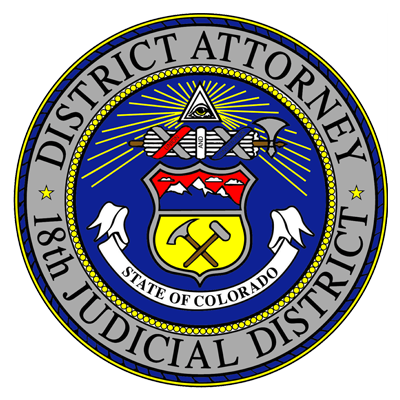CORA – Colorado Open Records Act & CCJRA – Colorado Criminal Justice Records Act
The District Attorney of the 18th Judicial District (the ” Agency”) is committed to transparency and open government. The following policy has been developed in order to implement the Colorado Open Records Act (“CORA”) (sections 24‐72‐201 to 206, C.R.S.) and the Colorado Criminal Justice Records Act (“CCJRA”) (sections 24-72-301 to 309, C.R.S.), in a uniform manner and better serve the people of Colorado. This policy is designed to help the Office of the District Attorney, 18th Judicial District balance the statutory requirements of CORA and CCJRA and the District Attorney’s constitutional and statutory obligations. This policy helps ensure the Agency complies in all respects with CORA and CCJRA and meets all of its constitutional and statutory duties to the People of Colorado in an orderly and expeditious manner.
Office Procedure for Handling Records Requests
The District Attorney’s Office will only accept records requests electronically via CORA/CCJRA Request Form. The District Attorney’s Office will not accept records requests made over the telephone or via social media. Records requests that cite the federal Freedom of Information Act will be treated as though they were made pursuant to the CORA or the CCJRA statutes.
When responding to a request for public records under CORA, the District Attorney’s Office will make every effort to respond within three working days as required by section 24‐72‐203(3)(b), C.R.S. The three working‐day response time begins the first working day following receipt of the request. A request received after noon or any day the District Attorney’s Office is officially closed will be considered received as of the following working day. The District Attorney’s Office may add up to a seven‐working‐day extension if extenuating circumstances apply as described in section 24‐72‐203(3)(b), C.R.S. The District Attorney’s Office will provide all findings of extenuating circumstances to the requestor in writing.
Broad, general requests will likely be more costly to the requestor because of the staff time required to fulfill these requests. The District Attorney’s Office may contact the requestor in an attempt to clarify or narrow a request. While not required, requestors may want to provide phone and e-mail contact information to facilitate communication regarding the request. The District Attorney’s Office has found that searches of paper records may require additional staff time to complete the request. Excluding searches of paper records and providing specific information on the nature of the documents requested, the timeframe the request covers, and other details such as the potential staff who may be affected, can help the District Attorney’s Office fulfill the request in a manner that may provide cost savings to the requestor.
Fees
When a substantial request is made — requiring the production of more than 25 pages of documents or more than one hour of staff time to locate or produce records — the District Attorney’s Office will charge the requestor for all copying expenses and for staff time in accordance with section 24‐72‐205(5)(a), C.R.S., section 24-72-306, C.R.S., and other applicable law. Before fulfilling a substantial request, the District Attorney’s Office will provide a cost estimate to the requestor. The cost estimate will include the estimated time for staff to search for, retrieve, redact, assemble and transmit the records in accordance with the following table. In extraordinary circumstances, the use of a third-party contractor may be necessary and will be discussed with the requestor in advance.
Service |
Fee |
| Making hard copies of documents | $0.25 per page |
| Non-attorney staff time | $20 per hour |
| Attorney staff time | $30 per hour |
| Specialized document production or specialized skills required to fully comply with request | $30 per hour |
The requestor must approve the cost estimate before the District Attorney’s Office will begin work on fulfilling the records request. The District Attorney’s Office may require an advance deposit up to one half of the expected cost before it will begin completing the request.
The timeframe the District Attorney’s Office has to complete the request will be tolled between providing the cost estimate to the requestor and the requestor approving the cost estimate or submitting the advance deposit, whichever is applicable.
Costs associated with a request must be paid in full before the District Attorney’s Office will produce the records. Payment by credit card or check must be made payable to the Office of the District Attorney, 18th Judicial District.
Abandoned Requests
If the District Attorney’s Office attempts to contact a requestor to clarify a request or discuss the scope of a request and the requestor does not respond within ten business days, the District Attorney’s Office will close the request and require the requestor to submit a new records request. The District Attorney’s Office will hold records assembled in response to a CORA or CCJRA request for no more than ten business days after the requestor has been notified that the records are available for inspection or pick-up. The holding period may be shorter for records which are needed for any use. Failure to inspect or pick-up the records within this time frame will be considered an abandoned request, and the request will be automatically closed.
Criminal Justice Records Requests
CORA requests for criminal justice records will be treated as requests made under CCJRA. The legislative policy regarding access to criminal justice records under CCJRA is more limited than access to public records under CORA. The courts have also construed CCJRA to favor less broad.
CCJRA creates two categories of records:
1. Records of official action. CCJRA defines an official action as “an arrest; indictment; charging by information; disposition; pretrial or post-trial release from custody; judicial determination of mental or physical condition; decision to grant, order, or terminate probation, parole, or participation in correctional or rehabilitative programs; and any decision to formally discipline, reclassify, or relocate any person under criminal sentence.” Section 24-72-302(7), C.R.S. The records of official action must be open for inspection.
2. Except for records of official actions, which must be available for inspection, all other criminal justice records may be open for inspection subject to the discretion of the official custodian. Section 24-72-304(1), C.R.S. The Agency will not release records under CCJRA, unless the requestor signs a statement affirming that the records will not be used for the direct solicitation of business for pecuniary gain. Section 24-72-305.5, C.R.S. The Agency may allow or deny inspection of CCJRA records. Section 24-72-305, C.R.S.
Additional Information
The Office of the District Attorney, 18th Judicial District does not provide legal advice to the general public, nor does it have the authority to determine if another agency or office has improperly denied a CORA or CCJRA request, or to require another agency to turn over records.
Additional questions are answered in the FAQ section –Click HERE to view
Click Here to Request CORA and or CCJRA materials (Request Form Will Open In New Tab)
Last Updated: March 1st , 2021

